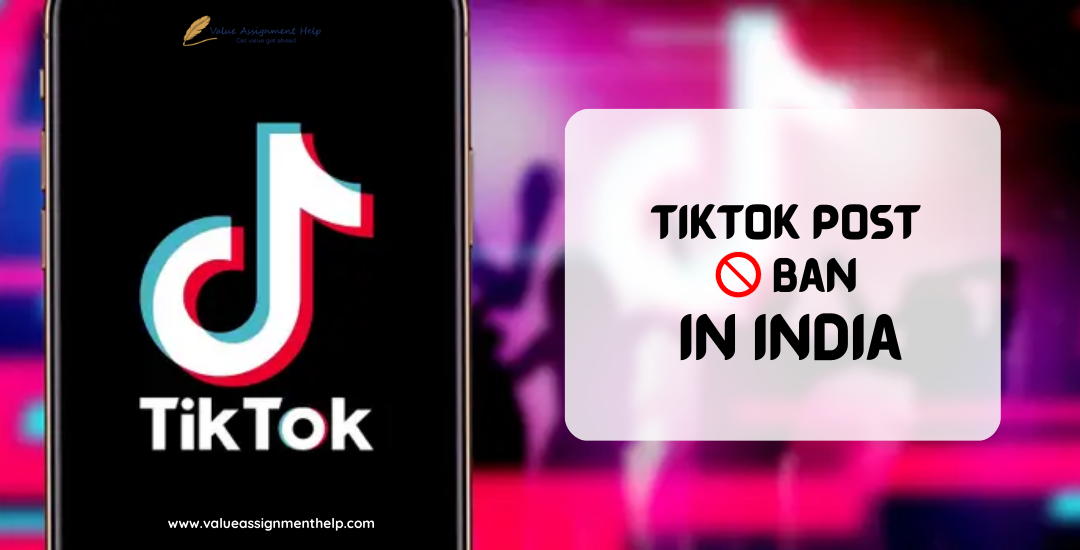
Search Assignments
Table of Contents
Our Experts

Search Assignments

Customers Reviews
A case study on Tik Tok and its operation post the ban was implied in India
If you dream of becoming popular overnight, you are not alone—millions worldwide dream of being in the spotlight. Many people have achieved overnight success with entertaining social applications penetrating deep into society. But amidst the vast ocean of the entertainment industry, the one application that has given birth to many social media influencers is TikTok.

Previously known as musically, TikTok is a user-submitted video streaming application where users can create a plethora of content. The app streams user-created content on music videos, dance performances, pranks and even brand advertising. For example, users could create and share short 15-second lip-sync videos in their initial days. Soon after the application took off in the US market, the variety in the content also expanded. Now, users submit dance acts, comedy and prank videos ranging from 15 seconds to 10 minutes in length.
Tik-Tok has gained steam among youth reaching over 3 Billion downloads worldwide, making it the first non-gaming app to accomplish the target after Meta-owned applications (Facebook, WhatsApp and Instagram). The reason for all glee is the platform's capability to turn "common people" into "influencers". Launched to entertain the masses, TikTok became the breeding ground for young visionaries.
History:
|
Origin Country |
China |
|
Parent-company |
ByteDance |
|
Launch date |
September 2016 (China), September 2017 (Global) |
|
Headquarters |
Beijing, China |
|
Revenue generated |
4.6 Billion $ (2021) |
|
Available in |
40+ languages |
Owned by Chinese tech giant-ByteDance, TikTok was not how we know it today. The application is an international version of the Chinese app Douyin-popular content creating application in china. ByteDance, in late 2017, bought Musical.ly for around 1 billion dollars and considering the strong userbase potential of Muscial.ly, TikTok was launched for the international market after the merger of Muscial.ly and Douyin users. Hence, an extraordinary application TikTok was born. TikTok became available for worldwide users after 2nd August 2018. Since then, the application has gained quite an auction among youth, especially in the US. With a daily watching time of 80 minutes, TikTok beats Facebook and Instagram in average watch time in the US.
Even though the app was launched just a few years back, it has snowballed its way through the industry, giving tough competition to its major rival-Meta.
TikTok has dominated the Chinese market and spread its wings in European nations. Last year, the app generated a total of 4.697-Billion-dollar revenue, with 147% growth from the previous year.
TikTok remoulded the entertainment industry. According to a survey, 80% of the participants reported that they find TikTok unique and authentic. User-friendly interface, easy-to-use features and fun ideas for showcasing user creativity are a few reasons for the popularity of Chinese applications. But very few know about the underlying truth: Youth interaction.
In highly stratified Indian society, TikTok surpassed social barriers of caste, colour and religion to provide a neutral platform for its users. The highly engaging and addictive algorithm of TikTok made it a buzz in the market. Moreover, the app supports 15 languages in India, making it accessible to diverse people.
Videos on the platform involve fun challenges and dance performances for its users, who instantly engage with them. It nurtures the feeling of belonging, and with the desire to want everything at their fingertips, Young teens today seek instant gratification.
TikTok provided everyone with equal opportunity to showcase their talents and was one of the first applications to introduce the idea of lip-syncing.
The app has, however, faced a fair share of controversies over its short lifetime. In the year 2019, the Indian government banned TikTok along with 273 other Chinese apps over the claim of data theft and national security. By that time, with over 600 million active users, India accounted for one-third of total app users. So why did the Ban not impact the revenue of TikTok?
The famous app was banned in 2019, along with other popular apps such as PubG Mobile, Shein, Aliexpress and more. The underlying reason for the Ban was growing tensions between India and China over the line of control (LOC) in Kashmir. Indian government created pressure on China by blocking access to applications nationwide, freezing a significant revenue stream for China. Indian users of the application felt concomitant effects. As a result, TikTok and related apps were removed from the play store and app store for download, and no additional updates to existing applications were provided.
After losing 600 million active users, the app did not take a dent post-ban. Although the app claimed to have lost billions of business following the Ban, the company's yearly revenue stated otherwise.
The fundamental reason for the growth was that it still generated 89% of its revenue. Following worldwide lockdowns, the surge in internet usage filled the void of losing one-third of users.
However, in the aftermath, the effects of the Ban were prevalent in India. According to a survey, the Ban led to the loss of 120 Cr. Earnings for Indian influencers. Many users reported stress, depression and anxiety after the Ban.
Kudos to TikTok's marketing strategy and branding; the revenue continued growing regardless of impediments in the Indian market. The pandemic was a blessing in disguise for social networking platforms. With the entire world population strangled at home, it only made sense for people to draw towards the internet for entertainment. During the first half of 2020, Sensor Tower recorded a massive rise of 23% in revenue generation from TikTok compared to the past year. Moreover, TikTok expanded enormously in western countries amid the pandemic.
When it comes to achieving success, TikTok knows no bound. The business has flourished in the past years and continues to do so by introducing new revenue schemes and marketing techniques. The revenue scheme for the application has been via video streaming and brand marketing, but the Chinese video streaming app has put in place a new revenue model-"In-app shop". This feature was launched in the UK for the first time, and since then, TikTok has planned to bolster the vision.
Example of in-app shopping services on TikTok (Source: Internet)
Following the massive success of its Chinese replica, Douyin, whose significant revenue comes from in-app shopping, TikTok is also following the same trajectory. This year, the feature was recently launched in the US, allowing users to shop for products without leaving the app. TikTok has substituted google to some extent. The young audiences have turned to TikTok to look for brands and related products directly rather than going to the browser.
No matter how high the young an audience speaks about the app, it is also notorious among government officials and intellects. FBI has recently released a report citing TikTok possess a national security threat. Repeatedly being involved in Data theft, misinformation, sexual content and illegal affairs, TikTok is fishy. Many times, violent videos of suicides and acid attacks have been trending on the app. Most often than not, the app receives many censor requests from government bodies.
The app is also found responsible for promoting anorexia, bullying and sexual harassment of minors. By featuring unrealistic filters, TikTok is setting unrealistic beauty standards. It reflects deeply on minor mindsets.
This enhanced model of TikTok makes it a formidable competitor to beat, both for the entertainment industry and eCommerce. Despite facing significant backlash in the Indian market, TikTok continues to conquer. With a high audience engagement rate,
With the growing interest of officials and critics, TikTok has also seen its fair share of debacles. To grow gradually, TikTok should abandon the smokescreen of content censoring and eradicate the root cause of government distress- Personal data vulnerability- to promote communal harmony. TikTok, if it wishes, has the power to influence the forthcoming generation. With so much at stake, TikTok should choose its image with great care.




No Comments